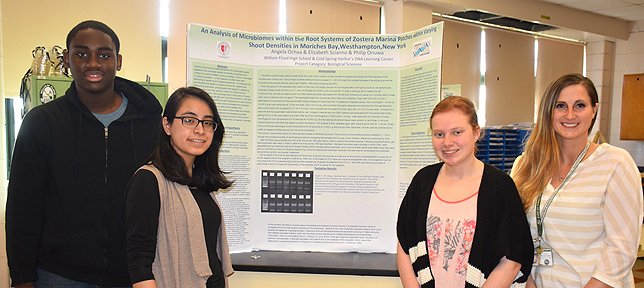Mastic Beach, NY - May 31, 2017 - William Floyd High School junior Elizabeth Scianno has been selected to represent William Floyd and the Cold Spring Harbor Laboratory DNA Learning Center’s Barcode Long Island student research program at the National Institutes of Health (NIH) Citizen Science Symposium this upcoming July in Washington, D.C. She will be presenting on her project focused on the analysis of Zostera marina, a species of seagrass, to determine if there is a more effective way to replant it. Scianno collaborated on this project with ninth graders Angela Ochoa and Philip Oriuwa.
“I am so proud of Elizabeth, Philip, and Angela,” said Victoria D’Ambrosia, William Floyd High School science research teacher. “They have put in an extraordinary amount of work into this project ranging from proposal writing to learning complex graduate level statistical analyses. Although the students are still formulating conclusions and analyzing the data, I think it is safe to say that they are excited about their findings and we are all so grateful for this opportunity from the DNA Learning Center.”
“The staff members at the DNA Learning Center were impressed with your research project and your dedication to the program, and are looking forward to seeing the results of your microbiome analyses,” wrote Sharon Pepenella, Barcode Long Island Program Co-Manager, in a letter to Scianno informing her of her selection to the NIH Citizen Science Symposium.
Citizen Science is a collaborative approach to research involving the public, not just as subjects of the research or advisors to the research but as direct collaborators and partners in the research process itself. The purpose of this workshop is to inform and engage NIH employees and contractors in discussions on how citizen science and crowdsourcing can enrich and further research as a complementary method, and to energize the local citizen science community.










